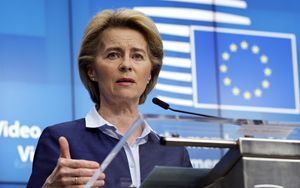(Finance) – As reported by Ansa quoting a European official, the EU Council asked for “an opinion” from the legal departments to check that the Commission Europeanpublishing the joint note between Ursula von der Leyen and the US president Joe Biden, has not “exceeded” its mandate. Specifically, the part of the note that aroused the Council’s alarm is the one on the address “geostrategic” as regards exports and investments and, even if not explicitly, relations with China. The position expressed by von der Leyen would have been judged “different” from what was established by the European Council last October and this triggered the request for a legal opinion.
Immediate response from European Commission who, through a spokesman, announced that he believes he has “kept the Member States informed” on the evolution of the negotiations with the United States which then led to the joint statement between Joe Biden and Ursula von der Leyen. As for the China, the president has made her position known “on several public occasions” and follows the strategy of “reducing the risks” resulting from excessive dependencies in key industries, such as raw material, “as happened with the Russia on energy”. “If future work requires it, the Commission will address the European Council and other Councils”, added the spokeswoman.
The question is about the voyage by the President of the European Commission a Washington where he met the American president to discuss the war in Ukraine and the opening of negotiations between the US and the EU for the creation of a free trade area with regard to critical raw materials, with particular attention to the consequences that the Inflation Reduction Act American (IRA) may have on European companies.
“We will continue to work to strengthen ours economic security, replying to threats concrete that we have identified. The United States and the European Union share concerns about the challenges posed by, among other issues, economic coercion, the weaponization of economic dependencies, and non-market policies and practices. which prompted the Council’s action. “Our respective existing controls on exports, incoming investment and research cooperation are essential tools and need to be updated to match a geostrategic environment evolving – we read at the end of the declaration -. We have a common interest in preventing the capital, experience and knowledge of our societies from fueling technological advances that will enhance the military and intelligence capabilities of our strategic rivals, also through outgoing investments”.
